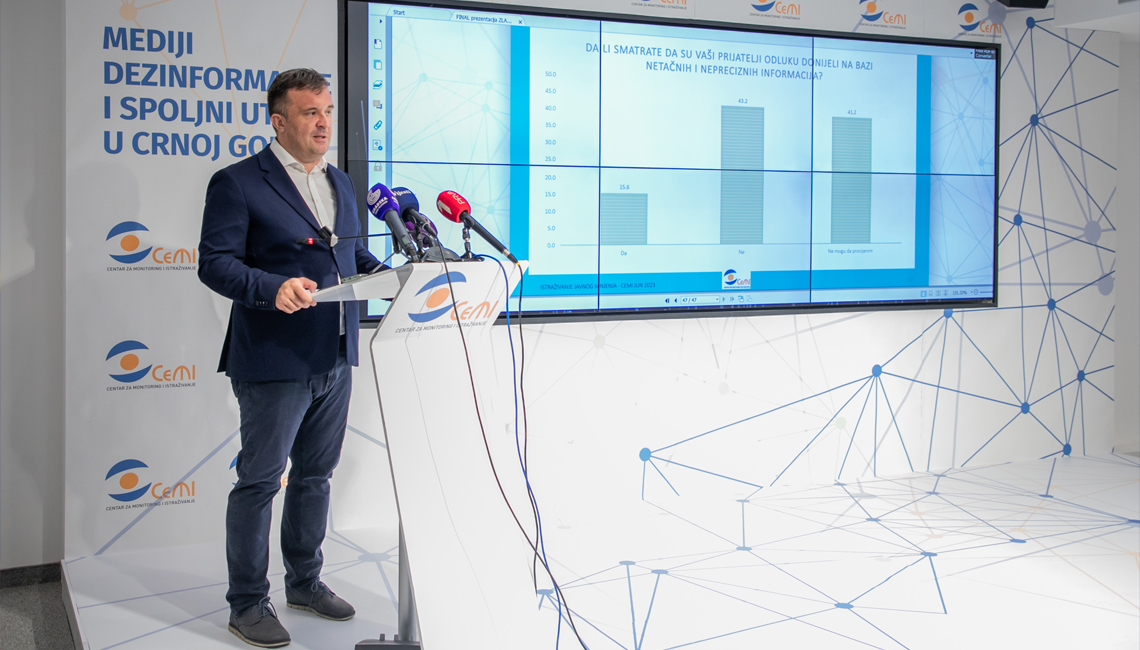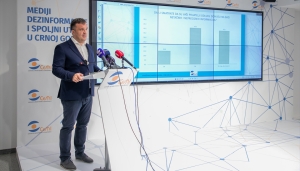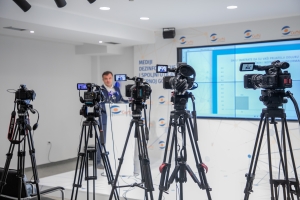Nearly half of the Montenegrin citizens, 45 percent, believe that they are influenced by disinformation when it comes to the political situation in Montenegro, as revealed by the research conducted by the Center for Monitoring and Research (CeMI).
The research, titled "Media, Disinformation, and Foreign Influence in Montenegro," was carried out from June 3 to June 9 of this year on a representative sample of 972 adult citizens of Montenegro.
Zlatko Vujović, the President of the Governing Board of CeMI, stated that citizens predominantly inform themselves about political events through traditional media and news portals.
"Among traditional media, television has absolute dominance when it comes to informing citizens about politics. Citizens have significantly more trust in traditional media compared to the information they receive through social media," Vujović noted.
He stated that when asked about their primary source of information about politics and political events, 60.4 percent of citizens said it was traditional media - TV, print media, or radio, 35.4 percent social media, 30.4 percent news portals, 11.7 percent conversations with family or friends, seven percent through a political party, 3.1 percent through conversations with a political party activist. Additionally, 7.1 percent expressed that they don’t follow politics, and six percent responded that they don’t know.
"Among the respondents who mentioned that their key source of information is traditional media, 94 percent of them get informed through TV, four percent through print media, and two percent through radio," Vujović stated.
He pointed out that the research showed that citizens have significantly more trust in traditional media compared to the information they receive through social media, with 48.5 percent of them having trust in news and information from traditional media, 16.7 percent trusting news and information from social media, 17.4 percent having trust in both sources and 15.1 percent not trusting either of them.
Vujović stated that the research showed that most respondents have trust in TV Vijesti, 49.1 percent, followed by the Vijesti news portal at 42 percent, RTCG at 40.4 percent, the daily newspaper Vijesti at 40 percent, the newspaper Dan at 36.1 percent, and the Café Del Montenegro (CDM) portal at 32.7 percent.
"If we measure trust through the average ratings of respondents who follow these media, the highest trust is in the daily newspaper Vijesti - with an average rating of 3.39, followed by TV Vijesti - with a rating of 3.36, then the Vijesti portal - with an average rating of 3.34, Dan - with an average rating of 3.27, RTVNK - with an average rating of 3.26, CDM - with an average rating of 3.24, and then Borba and RTCG with an average rating of 3.15. The range of ratings ranges from 1 to 5," Vujović noted.
He pointed out that through the research, they aimed to examine how citizens perceive the influence of external factors on key political actors and media in Montenegro.
"The research showed that the majority of citizens believe that Montenegro should have the closest relations with the EU, 56 percent of them, followed by Serbia at 27 percent in terms of frequency of responses. The EU is a more common choice among younger individuals and females, while 41 percent of respondents over the age of 65 believe that Montenegro should have the closest relations with Serbia," Vujović said.
According to his words, the research showed that supporters of the Bošnjačka Stranka and the Koalicija Zajedno (DPS, SD, LP) in the largest percentage, over 80 percent, believe that Montenegro should have the closest relations with the EU, followed by supporters of the Demokratska Partija Socijalista (DPS) and URA with 53.1 percent, Evropa Sad with 50.4 percent, and the Koalicija za budućnost Crne Gore with 22.8 percent.
"When it comes to foreign policy, regarding the question of the closeness of relations, there has been a slight increase in the percentage of those who believe it should be aligned with Russia, with every eighth respondent choosing it, and every tenth respondent choosing America. The EU is the majority choice for all age groups. Interestingly, there is an intergenerational polarization among those who choose America or Russia, with younger individuals tending to opt for America and older individuals for Russia," Vujović noted.
He also said that with the research they wanted to obtain data on which of the foreign countries citizens perceive to have the greatest influence on political actors in Montenegro.
"When it comes to the influence on the president of the country, which was Milo Đukanović at the time of the research, in the opinion of the largest number of respondents, the EU has the highest 45.5 percent, followed by Serbia with 22.5 percent and the USA with a significantly lower frequency with 16.9 percent. And when it comes to the Government in a technical mandate, the EU is most often perceived as a foreign factor with the greatest influence, followed by the USA and Serbia," said Vujović.
He pointed out that it is interesting that the percentage of answers from the USA is increasing, and that the percentage of answers from Serbia is decreasing in relation to the increase in the age of the respondents.
"In the group of respondents aged over 65, there is almost an equal share of those who believe that the EU has the most significant influence on the Government and those who believe it's the United States," Vujović added.
Discussing the influence on the Chief Special Prosecutor, Vujović mentioned that the research showed that the EU has the most significant influence at 43.3 percent, followed by the United States at 20.8 percent and Serbia at 13.9 percent.
"When it comes to the United States, the strongest influence is perceived on the judiciary, prosecution, and non-governmental organizations. It can be concluded that the population perceives that some media are more pro-Western (under the influence of the EU or the United States), while others are more influenced by Serbia," Vujović stated.
He said that the research showed that citizens perceive Serbia as a foreign factor with the most significant influence on the ruling coalition (DF, URA, SNP, Demokrate) 41.1 percent, the President of Montenegro 22.5 percent, Evropa Sad 21.8 percent, the Parliament of Montenegro 21.6 percent, the Government 19.2 percent, municipalities 16.9 percent, the Chief Special Prosecutor 13.9 percent, the prosecution 13.8 percent, the judiciary 13 percent, NGOs 11.1 percent, and the opposition 5 percent.
"Citizens have said that the EU is the foreign factor with the most significant influence on Evropa Sad 57.6 percent, the Parliament of Montenegro 51 percent, the Prosecutor's Office 47.8 percent, the President of Montenegro 45.9 percent, the opposition (DPS, SDP, SD, BS) 45.5 percent, municipalities 45.4 percent, the Government 45 percent, the Chief Special Prosecutor 43.3 percent, NGOs 42.7 percent, the judiciary 42.5 percent, the ruling coalition 26.2 percent," Vujović said.
According to him, 25.1 percent of citizens believe that the USA is the foreign factor that has the greatest influence on the judiciary, the prosecution 24.9 percent, NGOs 21.1 percent, the government 20.8 percent, municipalities 20.6 percent, the president of Montenegro 20 .5 percent, the chief special prosecutor 18.9 percent, the Parliament of Montenegro 18.8 percent, the opposition 17.1 percent, the ruling coalition (DF, URA, SNP Demokrate) 16.9 percent and Evropa Sad 13.2 percent.
The research has shown that citizens believe that Serbia, as a foreign factor, has the most significant influence on the portal Borba, IN4S, Dan, and RTV NK. They are followed by Vijesti, Prva TV, Nova M, Antena M, RTCG, Gradska TV, E TV, M portal, and CDM. When it comes to the EU as a foreign factor, the research has shown that citizens perceive its greatest influence on RTCG, CDM, Gradsku, E TV and M portal, Nova M, and Prva TV.
It was pointed out that the research has shown that citizens believe that the United States, as a foreign factor, has the most significant influence on RTCG, Gradska TV, Antena M, CDM, TV E and M portal, Nova M, and Prva TV.
Vujović emphasized that the research findings indicate that citizens perceive exposure to political disinformation, and a significant proportion of them believe that political decisions aren't made based on accurate information.
"A significant proportion of respondents, 38.5 percent of them, state that they were exposed to persuasion as to who they will vote for. In this research, three percent of respondents indicated that they were offered money to vote for one of the options or not to vote at all," Vujović said.
He also said that the majority of respondents, 54.8 percent of them, believe that they made the decision for whom to vote for in the presidential elections based on accurate information.
"Disinformation and unverified information circulated during the pre-election campaign were most often believed by a smaller number of respondents. However, none of the tested claims were decisively rejected as untrue by the majority. Additionally, the research showed that agreement with these statements strongly depends on the political orientation of the respondents," stated Vujović.
He indicated that a non-negligible percentage of the respondents stated that they were persuaded in different ways to vote in the presidential elections, while one number, in terms of percentage, a small number of respondents stated that they were offered money in order to vote for a certain candidate or to abstain from voting.




